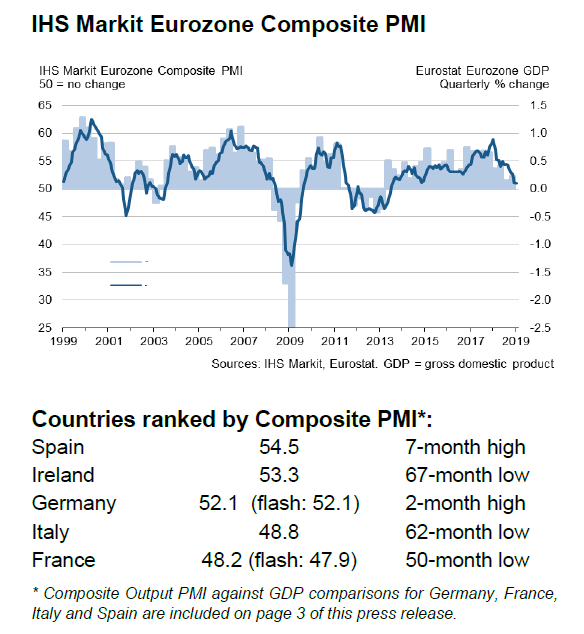Eurozone PMI Services was finalized at 51.2, revised up from 50.8. That’s unchanged from the 49-month low recorded in December. PMI Composite was finalized at 51.0, lowest in five-and-a-half years. Among the countries, France PMI composite dropped to 48.2, 50-month low. Italy was at 48.8, 52-month low. Germany recovered to 52.1, a 2-month high. But Ireland dropped to 53.3, 67-month low.
Chris Williamson, Chief Business Economist at IHS Markit said:
“The eurozone has started 2019 on flat note, with growth close to stagnation amid falling demand for goods and services. The PMI indicates that GDP is growing at a quarterly rate of just 0.1%, setting the scene for the region’s worst quarter since 2013. Such a weak start to the year would mean the current consensus forecast for 1.5% GDP growth in 2019 is likely to be revised lower, and hence lead to more dovish signals from the ECB.
“What started as a manufacturing and export-led slowdown has shown increasing signs of infecting the service sector. The manufacturing PMI numbers are indicative of the goods-producing sector slipping into recession, while growth in services is now running at its lowest for four years. Worst may be yet to come: new orders received by factories are declining at the steepest rate for nearly six years and new business inflows into the service sector have stalled. Demand is consequently falling to an extent not seen since mid-2013.
“Employment growth is now also being affected by a growing reticence to expand capacity, with jobs being created at the slowest rate for over two years.
“The deteriorating picture looks broad-based. Italy is in its steepest downturn for over five years and France has sunk into its sharpest decline for over four years. Faster growth in Germany and Spain meanwhile looks tenuous, as order book trends deteriorated in both cases.
“The survey indicates that political uncertainty, both global and local, is increasingly taking a toll on growth, dampening demand and driving increased risk aversion. Add in rising global trade tensions, Brexit uncertainty, the ‘yellow vest’ protests in France and a spluttering auto sector, it’s clear that the business environment is at its most challenging since the height of the region’s debt crisis.”

